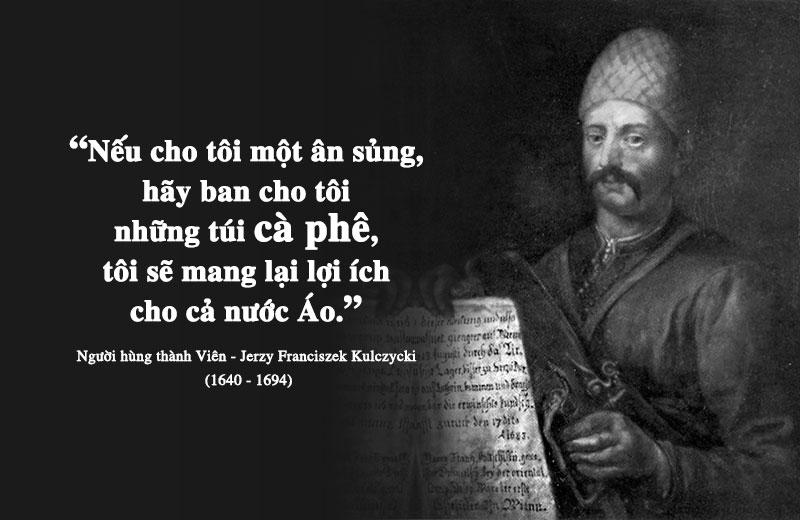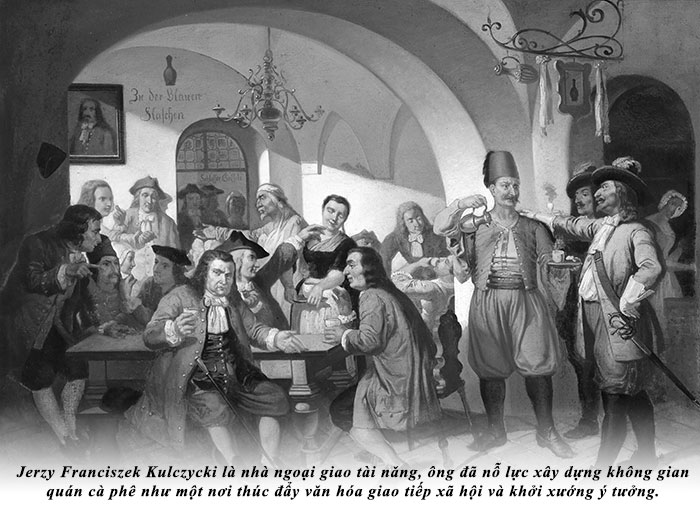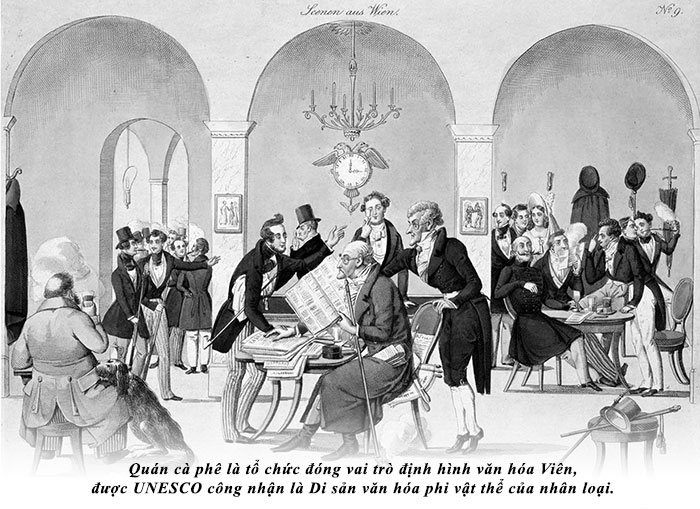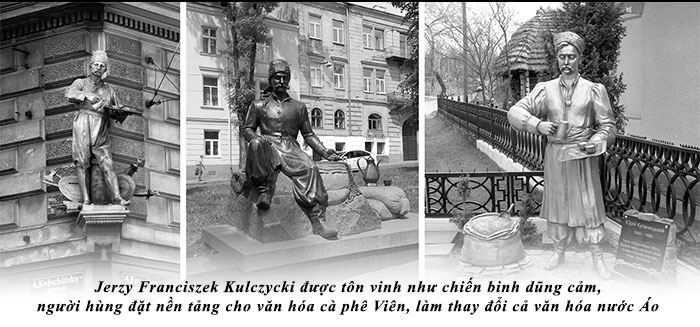Article 31: Jerzy Franciszek Kulczycki – coffee and a hero’s warrior spirit
Coffee was introduced to Vienna during a special historical period, becoming a symbol of victory after a battle that changed European history, ending the long conflict between the Roman Empire and the Ottoman Empire.

“If you do me a favor, give me bags of coffee, I will benefit all of Austria.” – Jerzy Franciszek Kulczycki (1640 – 1694)
Hero amidst war time
In the 15th century, Vienna (the capital of Austria) was a military complex and one of the administrative centers of the Roman Empire. Vienna controlled the area of the Danubian River (stretched from Central-Eastern Europe to the Black Sea) and the Eastern Mediterranean overland routes, prosperous trading for many centuries, becoming a strategic land in the ambition to dominate Europe of many contemporary empires.
Jerzy Franciszek Kulczycki – a businessman and diplomat fluent in Polish, Serbian, Turkish, German and Romanian employed to work for an Austrian trade organization specializing in business negotiations with Eastern countries. Jerzy Franciszek Kulczycki worked for many years in the Balkan peninsula and the Ottoman Empire, where he discovered the local coffee culture. In the mind of a merchant, he quickly saw the commercial potential of this unique drink. However, with the coffee trade tightly controlled by the Ottoman Empire, Jerzy Franciszek Kulczycki could only learn how to make it and return to Vienna.

Jerzy Franciszek Kulczycki is a talented diplomat, he worked hard to build the cafe space as a place to promote social culture and initiate ideas.
In the summer of 1683, taking advantage of the bubonic plague situation in Vienna, the Ottomans mobilized 300,000 soldiers to attack the city of Vienna, as a springboard to expand the empire’s territory to Western Europe. The Roman garrison in Vienna numbered only about 15,000 soldiers. The widespread disease, lack of food supplies and weapons made the city unable to hold out and quickly faced the risk of surrender.
People were extremely confused, trying to escape. Even the army commander was almost desperate. If Vienna fell, the whole of Europe would be in danger of being annexed by the Ottomans. Instead of fear, Jerzy Franciszek Kulczycki decided to act for the survival of the city. He disguised himself as an Ottoman, went upstream, straight into the guard camp, through the enemy’s ranks, crossed the Danubian River to find a rescue force. Jerzy Franciszek Kulczycki nearly died when he was recaptured, but his knowledge of Ottoman language and culture led the enemy to believe he was Ottoman and was later released. Jerzy Franciszek Kulczycki finally met the Polish army commander for aid.
As soon as Jerzy Franciszek Kulczycki returned with the good news, the Viennese spirit was immediately elated and filled with hope of victory. Although the aid force was not equal to one-third of the Ottoman army, the Polish-Roman alliance coordinated inside and out to break the siege, liberating Vienna completely.
This victory was considered a turning point in world history, ending the 300-year struggle between the Roman Empire and the Ottoman Empire, and stopping the Ottoman threat to Europe. Because of his important role in the battle, Jerzy Franciszek Kulczycki was honored as a “Vienna Hero”. He was rewarded by the King of Poland who could choose any loot including lots of gold and precious items.
Jerzy Franciszek Kulczycki did not take gold coins, he only asked for coffee bags left behind by the Ottomans. Jerzy Franciszek Kulczycki received all the bags of coffee beans as a reward for his bravery. Right in 1683, he opened the cafe Hof zur Blauen Flasche and taught the Viennese the art of making and enjoying coffee.
Changing Austria with coffee culture
Jerzy Franciszek Kulczycki spread the coffee culture with all his heart and love. He built a coffee shop model that was not simply a place to consume products, but a place to promote social communication, share thoughts and ideas. The Viennese of this period often lived in cramped houses, so they went to cafes as “extended living rooms” or second homes to meet the community. The cafe especially attracted the nobility, creating a trendy space that anyone would want to come to.

The cafe is an organization that plays a role in shaping Viennese culture, recognized by UNESCO as an Intangible Cultural Heritage of Humanity
However, the Viennese were not used to the strong and bitter taste of coffee in the style of the Ottomans. Jerzy Franciszek Kulczycki added milk and honey (then sugar) to the coffee to reduce the bitterness. Thanks to this innovation, Jerzy Franciszek Kulczycki was considered to be the first to make coffee according to the new recipe, creating the signature and famous Vienna “Wiener Melange” drink. Besides, he served coffee along with Croissant cake (or Kipferl) – a cake shaped like a crescent moon on the Ottoman flag. Coffee and croissant were considered a symbol of victory, a pride of strength and warrior spirit of the Viennese in particular and the Austrians in general. Also from such uniqueness, Viennese coffee style after centuries have still remained intact with the characteristic of enjoying coffee with cakes.
Jerzy Franciszek Kulczycki’s cafe laid the foundation, developing coffee culture as an important part of Austrian life and social structure. Moreover, the creation of recipes and building the identity of the restaurant space had made coffee easily accessible to Westerners. Because of this, the Austrians are always proud to be one of the countries where coffee originated and spread throughout Europe. In particular, the Viennese cafe “Wiener Kaffeehauser” has grown more brilliantly than in any other European country, becoming a typical organization that plays a role in shaping Viennese culture, recognized by UNESCO as an Intangible Cultural Heritage of Humanity.

Jerzy Franciszek Kulczycki was honored as a brave warrior, the hero who laid the foundation for Viennese coffee culture, changing the whole culture of Austria.
Vienna Hero Jerzy Franciszek Kulczycki was also honored as the “patron of Viennese coffee”. Every October, cafes will hang a portrait of Jerzy Franciszek Kulczycki in his memory. A street in Vienna is named after him and his statue is also on that street.
THE REAL COFFEE
ROASTED ONLY FOR PEOPLE OF WISDOM!
Source: “The Philosophical Way of Coffee” – copyright by Trung Nguyen Legend


